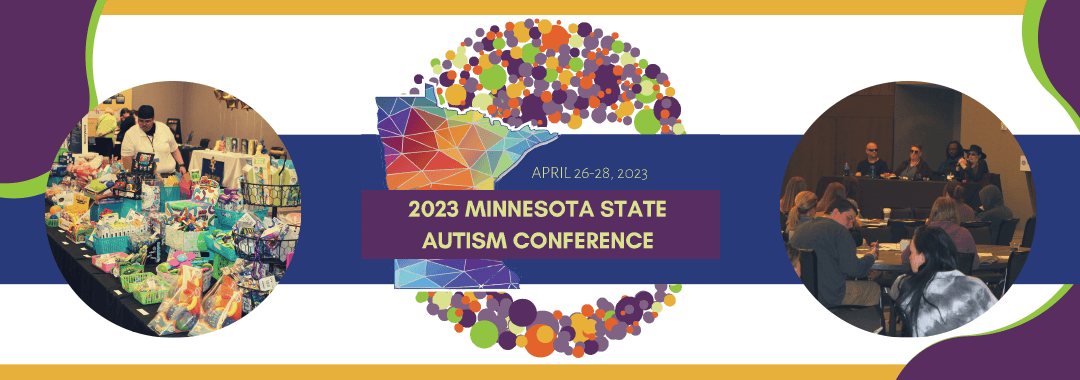Autism Experts Set to Speak at Minnesota State Autism Conference April 26-28

The Autism Society of Minnesota (AuSM) has curated a wide-ranging slate of autism experts and self-advocates as presenters for its 2023 Minnesota State Autism Conference, returning April 26-28, 2023. Keynote speakers include autistic journalist and author Eric Garcia, speech-language pathologist and social-cognitive therapist Kari Zweber Palmer of Social Thinking, and clinical psychologist and author Dr. Mona Delahooke.
AuSM’s conference will also feature 28 breakout sessions geared toward autistics, caregivers, educators, advocates, service providers, and support professionals. Between sessions, attendees have access to a resource fair with dozens of supporting exhibitors, as well as the AuSM Shop – an autism-focused store that includes books, sensory-friendly and self-care products, and other resources. For autistics seeking accommodations during the event, the conference’s accessibility guide is here. AuSM also created these audience-specific guides to make the conference more approachable, including: Autistic’s Guide to Conference; Educator’s Guide to Conference; Family Member’s Guide to Conference; and Therapist’s Guide to Conference.
“Now in its 28th year, the unifying goal for our Minnesota State Autism Conference is to advance our shared understanding of autism and neurodiversity through education, community building, knowledge sharing from lived experiences, and connections to resources and supports serving people with autism and their families,” said AuSM’s Executive Director Ellie Wilson.
Where: Marriott Minneapolis Airport Hotel
When: April 26-28, 2023
More info and registration: https://ausm.org/events/state-autism-conference/
For a detailed conference schedule of all sessions, click here and see summary below.
WEDNESDAY APRIL 26
12:30-4:30 p.m.: Pre-Conference Workshop – This half-day kickoff is geared toward educators, recently-diagnosed autistics and their families, and others who may be new to the autism community. Hosted by AuSM’s counseling and education teams, attendees will get a foundational grounding that preps them for the rest of the conference.
THURSDAY APRIL 27
8-9:30 a.m. Keynote: Understanding Emotions and Strategies to Develop Self-Regulation, presented by Kari Zweber Palmer
10-11 a.m.: Breakout Sessions I
- Strategies for Choosing the Right Goals and Following Through, presented by James Rechs
- Supporting Self-Advocacy for Teens and Young Adults with Disabilities, presented by Cole Sorensen
- Building Inclusion: A Movement Towards Communities as Purposeful Natural Supports, presented by Sonya Emerick and Paula Luxenberg
- Creating Accessible Events From the Ground Up, presented by Zephyr James
11:15 a.m.-12:15 p.m. Breakout Sessions II
- What Happens if Sub-Minimum Wage Goes Away? The Task Force Has a Plan!, presented by Larissa Beck, Andrea Zuber, and Dalaine Remes
- Neurodiversity in the Workplace: The Power of Unlocking Different Talents and Perspectives, presented by Aja Wolfe
- Eliminating Fear of Difference Through Education, presented by Abby Pearson and Brittany Barutt
- The Intersection of Autism, Literacy, and Communication, presented by Kayna Plaisted
1:15-2:45 p.m. Keynote: A New Vision for Supporting Autistic and Neurodivergent Students, presented by Dr. Mona Delahooke
3:15-4:15 p.m. Breakout Sessions III
- The Importance of Sexual Education for Autistic People (Including AAC Users), presented by Donnie Denome
- Supporting Individuals with Profound Intellectual and Multiple Disabilities (PIMD), presented by Eric Ringgenberg
- Trauma, Special Needs and Interventions, presented by Tamera Pulver
- Centering the Margins: Intersectionality, Power and Radical Solidarity, presented by Ashley Oolman
FRIDAY APRIL 28
8-9:30 a.m. Keynote: The Past, Present, and Future of Autism Politics, presented by Eric Garcia
10-11 a.m.: Breakout Sessions I
- Transitioning Together: A Community Partnership Promoting Culturally Responsive Approaches to Transition Planning, presented by Fatima Molas, Rufo Jiru, Rebekah Hudock, Maren Christenson Hofer, Chimei Lee, and Erika Schulz
- Regulation Stations, presented by Elizabeth Duffy and Michelle Pettit
- Using Dialectical Behavior Therapy to Help Adolescents Manage Stress and Anxiety, presented by Ann Duevel
- What is Disability Justice and Why Does It Matter?, presented by Jules Edwards, Brittanie Hernandez-Wilson, and Jillian Nelson
11:30 a.m.-12:30 p.m. Breakout Sessions II
- Clearing up the Confusion about Transition from School to Adulthood (part 1 of 2), presented by Lindsey Horowitz and Alyssa Klein
- Make it Make Sense: Practical Coping Techniques for Trauma, presented by Sara Lahti
- Ableism in Education: What Educators Need to Know, presented by Sonya Emerick, Maren Christenson Hofer, and Ryan Haenze
- Developing Self-Regulation with Biofeedback and Self-Hypnosis, presented by Dr. Andy Barnes
1:30-2:30 p.m. Breakout Sessions III
- Clearing up the Confusion about Transition from School to Adulthood(Part 2), presented by Abbie Wells-Herzog and Margie Webb
- MNprov Recess – Stretch Your Legs and Stretch Your Brain, presented by Michael Bruckmueller and Kelly Kautz
- Updates to the DSM: How the DSM 5 TR Expands Recognition of Autism Characteristics in AFAB and Racially Diverse Individuals, presented by Beth Pitchford
- Working as a Team to Support Our Students: Navigating the IEP System and a Student’s Legal Rights in Education, presented by Ryan Haenze and Yumma Moore
2:45-3:45 p.m. Breakout Sessions IV
- When the Frontal Lobe Does Not Cooperate, presented by Sara Swan
- Don’t Sleep on Sleep – Practical Sensory Approaches to Support Rest, presented by Meagan Flom
- How Providers and Educators Can Work With Autistics To Build Accessible Services, presented by Rene Joy
- Supporting Autistic Youth: Insights from the Autism Mentorship Program, presented by Megan Perera, Emily Goldberg, AJ Hokland, and Cameron Hallonquist
For those unable to attend in-person, AuSM is offering a virtual pass to 13 breakout sessions co-presented in partnership with the Autism Society of Greater Wisconsin. More info on virtual content here.
About the Autism Society of Minnesota (AuSM)
Founded in 1971, AuSM’s mission is to create connections, empowering everyone in the autism community with the resources needed to live fully. AuSM seeks to enhance the lives of all who are part of the Minnesota autism community, with a fundamental commitment to advocacy, education, support, collaboration, and community building. AuSM is a 501(c)(3) nonprofit organization. To learn more about AuSM’s programs, services, and advocacy, visit www.ausm.org.